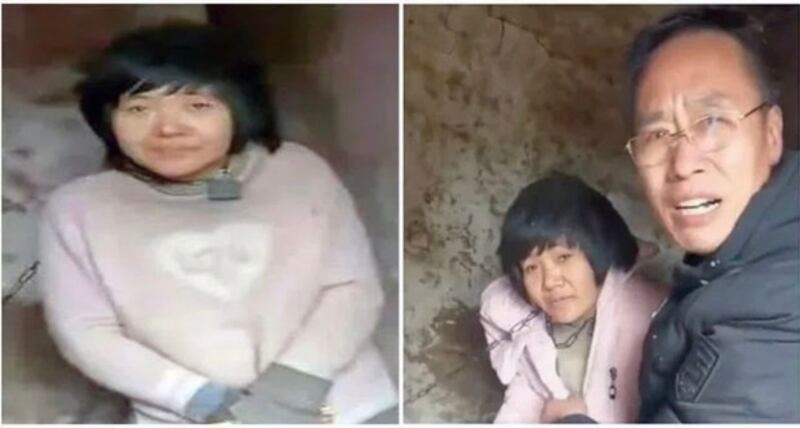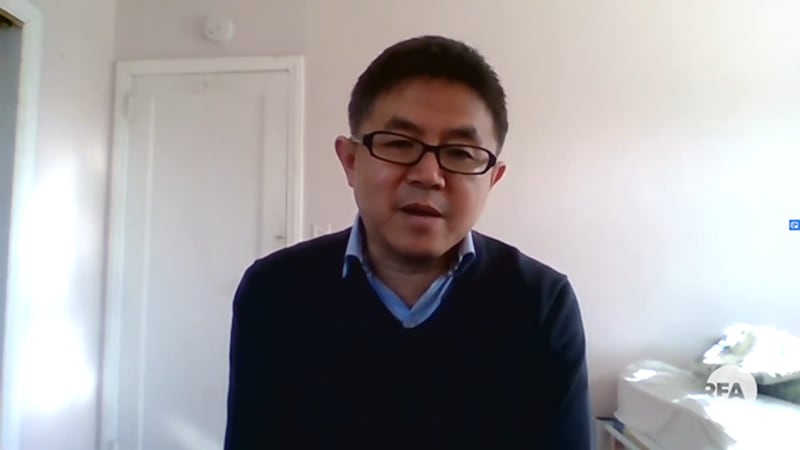Public anger over widespread trafficking in women and girls, mostly for "marriage" to men who can't find willing partners, is running in high in China since a woman was found chained by the neck in a freezing outbuilding in the eastern province of Jiangsu in January.
The ministry of public security announced a "strike hard" campaign against trafficking in women and children to run from March 1 to the end of the year, while premier Li Keqiang called in his annual work report this week for a "severe crackdown" on the crime, and for greater protection of the rights of women and children.
But despite the unprecedented public attention being given to this form of organized crime, analysts and activists said this "strike hard " campaign isn't the first, and that the political will is lacking at local level to eradicate its systemic causes.
Part of the problem is the systematic disempowerment of victims, many of whom are abducted, trafficked and subjected to regular abuse from a young age, according to Zhang Jing, the New York-based founder of Women's Rights in China.
Zhang said abducted women are often kept locked up by their persecutors, leaving them with severe trauma and other mental illness.
"They suffer physical and mental trauma and abuse, so if they weren't mentally ill before, they will be after that," she told RFA.
Some women develop Stockholm Syndrome, a state of intense dependence on and emotional attachment to abusers by victims of kidnap and prolonged incarceration and abuse, she said.
"People who have been abused for a long time become habituated, so they just see it as a part of their lives, and may not realize it is abuse, and may even think it's justified," Zhang told RFA.
"Then, one day their abuser will bestow a small favor on them, like a new dress to wear, or something nice to eat, and they will feel grateful."

Low success rate
In several years of running an anti-trafficking rescue operation to rescue bought brides and other abuse victims, Zhang says her organization has only managed to rescue 28 women and children.
"The rate at which we are rescuing them is very, very low," she said. "It's very sad, because there are so many victims."
Investigator Yao Cheng, who works for Women's Rights in China, said huge numbers of trafficked women and girls wind up in similar situation to the woman identified on her "marriage certificate" as Yang Qingxia, who was found in Jiangsu's Feng county.
"A lot of these kids wind up just like the chained woman in Feng county after they are abducted and sold," Yao said. "So when we look for missing children, more than half of the people we find are women, who are now [in a forced marriage] with children of their own."
Traffickers make use of a range of strategies to lure girls and young women into their net, including violent kidnap, drugging and deception.
The majority of victims are removed from their hometowns without their consent, although they may have the consent of their families, who have received money in return.
Then, they become increasingly hard to trace, as traffickers have a pre-packaged new identity waiting for them, complete with ID card and household registration documents, procured by bribing the local police, he said.
"Then they have a household registration somewhere else with a fake name, date of birth and so on, which means you can't find them."
Girls are in greater demand than boys, Yao said.
"They will buy a girl for a few thousand yuan, keep her at home as free labor, then she can become a daughter-in-law when she grows up, which saves money [on a dowry or betrothal gift]," he said. "Some traffickers want to make money out of the girls and send them off to [adult] entertainment venues."
He cited the case of Deng Lurong, a woman he found at the age of 19 in 2011, sheltering in a woodshed in Dabeishan in the eastern province of Anhui.

'Excess birth'
Deng, who may have an intellectual disability, was an "excess birth" disowned by her parents who had been raped by a teacher in her village at the age of 13, then abducted by her uncle at 14 and sold to a man in his 40s in nearby Beiyu township.
"She was forced to offer sex to men in the village, whose ages ranged from 30 to 60, for 20 yuan a time," said Yao Cheng.
"People in the village said she ran away often, and would stay in the fields, foraging from the crops and sleeping in a haystack, because of her abuse at the hands of so many men," he said, drawing a parallel with the Revolutionary Model Opera, the White-Haired Girl, a communist horror story of the commodification and abuse of women in "the old society," before the CCP took power in 1949.
"She was a modern-day White-Haired Girl," he said.
When Yao found her, she was barely able to speak, but wanted to go back to the village to fetch her blind son.
"Things got pretty dangerous," said, a People's Liberation Army (PLA) veteran who, like the other anti-trafficking activists, volunteers his time and finances his own search and rescue operations. "A lot of people came to the door armed with poles and hoes."
"They knew we want to expose such things, and that if we did, that they would be regarded as criminals," he said.
Ultimately, Deng chose to stay where she was to protect her son.
"Sometimes when we can't save people," Zhang said. "Like in Deng Lurong's case, we found her and called the police for her. We did so much, but we still couldn't save her."

Colluding officials
Trafficking gangs often rely on intricate webs of colluding officials, police officers and other government employees to exist, all of whom close ranks when do-gooding investigators come to town.
They include police, doctors, civil affairs bureau officials, family planning bureaus, staff in sub-district offices and township governments, and CCP village committees, Zhang said.
"Usually they won't let you [go looking for victims]," she said. "They tell you to leave, and say your publicity materials aren't allowed there."
"If you don't leave, they tear down your posters, then the police in the hometowns where the children went missing will summon their parents to the local police station for questioning."
Chinese AIDS activist Wan Yanhai, who is famous for his public health work among Chinese sex workers in the 1990s, said many of the women he worked with at that time had been abducted or trafficked.
"Many of them had been brought away from their hometowns as young girls by women from the same town or village, who seemed to them to be successful older sister figures," Wan told RFA.
"They only found out when they arrived in the city that they were there for sex work," he said. "Some would resist, some would be forced into it, and some of them may have accepted it. This happened a lot."
Wan said there is scant incentive for public health officials or even non-government groups to report victims of trafficking to the police, because they need to maintain good relationships with venue owners if they are to help the women working there.
Tens or hundreds of thousands?
According to a 2018 article by Zheng Tiantian, professor of anthropology at New York State University, more than 90,000 women and girls were trafficked in China in 2008 alone, although Zheng says the true figure is likely to be much higher.
Yao had his own estimate based on his years of experience in the field.
"From 1980 to 2016, when the one-child policy ended, 200,000 children were being abducted every year at the peak," he said. "On average, 100,000 children are kidnapped every year, which is one million every decade and more than three million over three decades."
A 2016 report published by the United Nations' Office on Drugs and Crime, 96 percent of trafficked people in 71 countries in 2014 were women or girls.
A senior Chinese police officer with experience of anti-trafficking operations said one of the biggest problems in China is that anti-trafficking statistics aren't included in performance evaluations for local police stations or individuals officers.
"There is no assessment of anti-trafficking results," the officer told RFA. "The powers that be don't pay much attention to it, and police are so busy with other work."
He said many police officers are engaged in what he termed "non-police work," citing the CCP's "stability maintenance" program, which aims to control and silence dissenting voices at politically sensitive times, and prevent any social activism from taking off in the first place.
Translated and edited by Luisetta Mudie.
